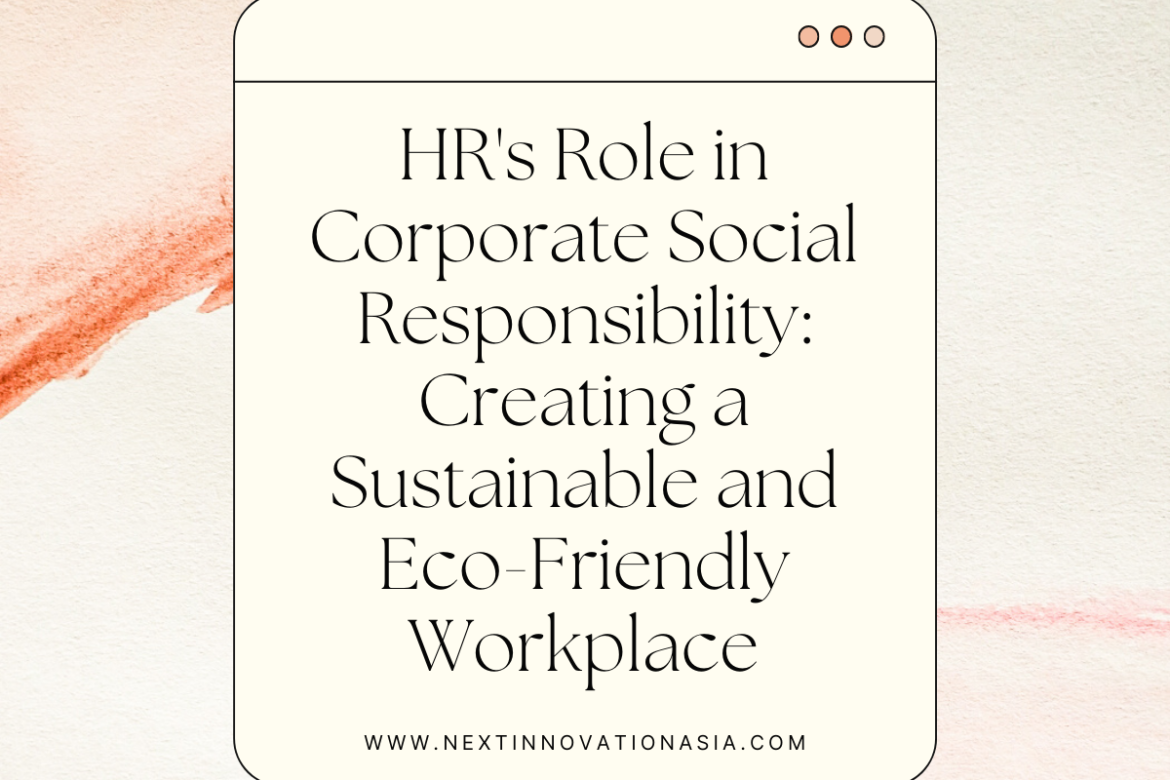HR plays a crucial role in promoting corporate social responsibility (CSR) and creating a sustainable and eco-friendly workplace. Here are some ways HR professionals can contribute to CSR initiatives:
- Develop a CSR Strategy: Work with senior leaders and stakeholders to develop a comprehensive CSR strategy that aligns with the organization’s values and goals. The strategy should outline the organization’s commitment to sustainability and eco-friendly practices, including specific targets and action plans.
- Employee Education and Engagement: Educate employees about the importance of sustainability and their role in creating an eco-friendly workplace. Conduct training programs and workshops to raise awareness about environmental issues, energy conservation, waste reduction, and responsible consumption. Engage employees through initiatives like green teams, sustainability committees, and employee-driven sustainability projects.
- Green Policies and Practices: Develop and implement green policies and practices across various HR functions. This includes initiatives such as waste reduction, recycling programs, energy-efficient practices, paperless operations, and responsible procurement. HR should lead by example and integrate sustainable practices into HR processes, such as digital document management and online employee onboarding.
- Sustainable Workspaces: Collaborate with facility management to design and maintain sustainable workspaces. Implement initiatives such as energy-efficient lighting, waste segregation systems, water conservation measures, and green building certifications. Encourage employees to adopt sustainable practices in their workstations, such as using reusable materials, minimizing paper usage, and turning off electronics when not in use.
- Sustainable Transportation: Promote sustainable transportation options for employees. Encourage the use of public transportation, carpooling, biking, or walking to work through incentives like subsidies, preferred parking for carpoolers, or bike-sharing programs. Consider implementing remote work or flexible work schedules to reduce commuting and carbon emissions.
- Responsible Supply Chain Management: Collaborate with procurement and supply chain teams to prioritize responsible and sustainable sourcing practices. Encourage the selection of suppliers and vendors who prioritize environmentally friendly products, materials, and packaging. Conduct audits and assessments to ensure suppliers comply with ethical and sustainable standards.
- Employee Volunteering and Community Engagement: Facilitate employee volunteering and engagement in environmental initiatives. Organize events like tree-planting drives, beach cleanups, or environmental awareness campaigns. Encourage employees to participate in community-based sustainability initiatives, fostering a sense of purpose and social responsibility.
- Metrics and Reporting: Establish key performance indicators (KPIs) and metrics to measure the organization’s progress toward sustainability goals. Regularly track and report on sustainability initiatives and their impact. HR can collaborate with other departments to gather data, analyze trends, and communicate progress to stakeholders.
- Partnerships and Collaboration: Seek partnerships and collaborations with external organizations, NGOs, or sustainability-focused initiatives. Engage with industry associations or local environmental groups to share best practices, learn from others, and drive collective action on sustainability issues.
- Continuous Improvement: Continuously evaluate and improve sustainability initiatives. Seek feedback from employees, conduct surveys, and assess the effectiveness of CSR programs. Regularly review sustainability targets, update strategies, and adapt practices to emerging trends and best practices.
By actively promoting sustainable practices and incorporating CSR initiatives, HR professionals can foster a culture of environmental responsibility, engage employees, and contribute to the organization’s overall sustainability efforts.

